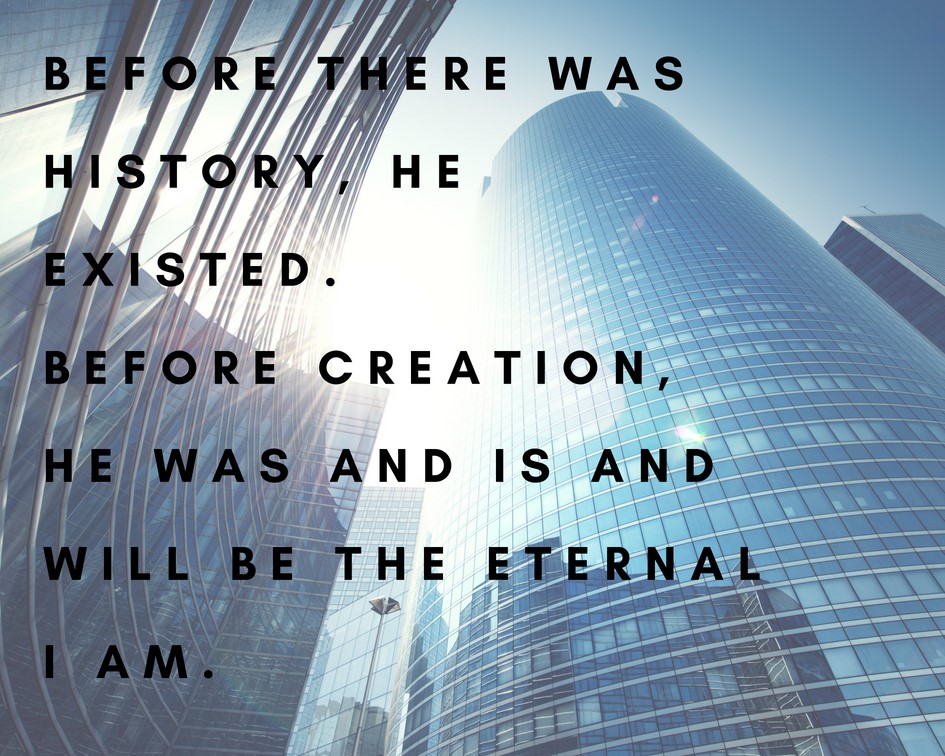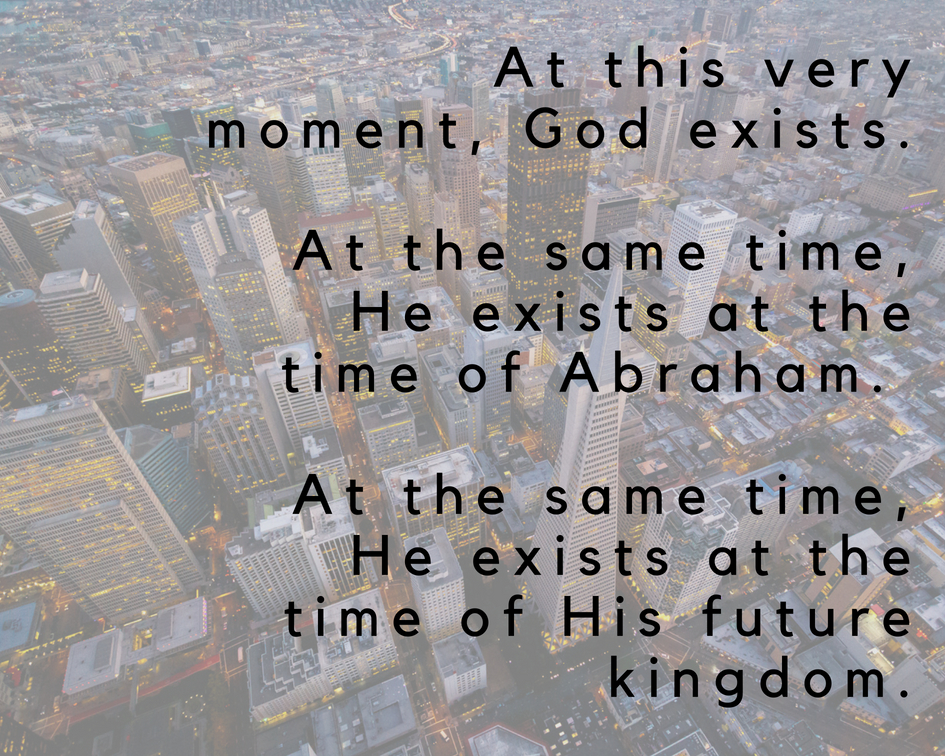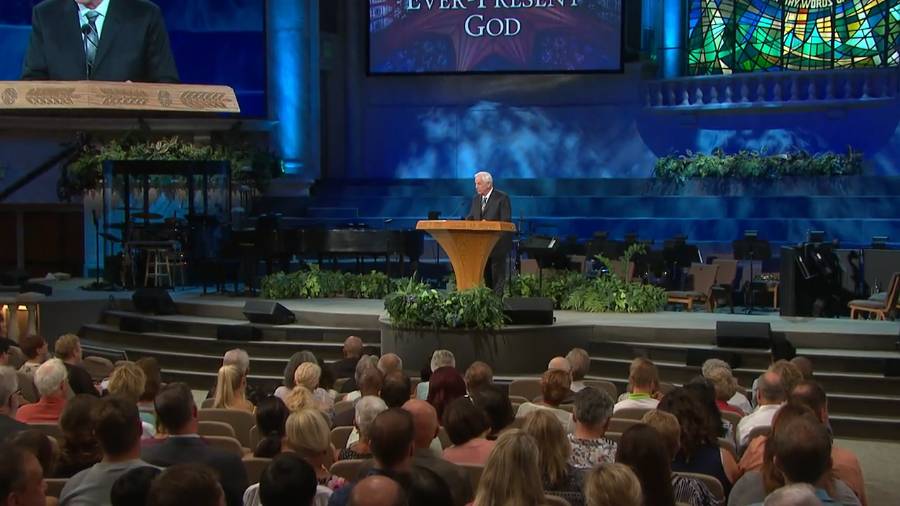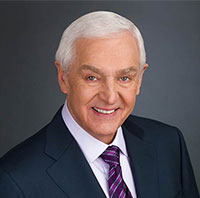How Big Is God?
By David Jeremiah
I find the idea of eternity mind-boggling and emotionally overwhelming, but it doesn’t leave me trembling with fear, but with joy. The reason? Eternity is one of the most beautiful attributes of the God I worship. Without a God who possesses an eternal nature, we would be condemned to true fear and forlorn despair. The Bible says, “The eternal God is your refuge, and underneath are the everlasting arms” (Deuteronomy 33:27).
The idea of eternity runs like a lofty mountain range through the Bible. Everywhere you turn, you find it. In fact, all our treasured biblical doctrines and truths would collapse without the reality of an everlasting God. Romans 1:20 speaks of “His eternal power and Godhead.” Romans 9:5 calls Him “the eternally blessed God.” Ephesians 3:11 speaks of His eternal purpose, and 1 Timothy 1:17 calls Him “the King eternal, immortal, invisible.” Genesis 21:33 says He is the “Everlasting God.” Psalm 100 says, “The Lord is good; His mercy is everlasting, and His truth endures to all generations” (verse 5).
Take all the doctrines you choose to embrace, all the things you like in the Bible, and then tell me in the same breath you don’t believe in eternity. If you can do that, you end up with absolutely nothing, because eternity is woven into every truth in Scripture.
Though the concept of eternity is beyond imagining, we can attempt a definition. The eternity of God refers to His existence backward throughout time and beyond, further than we can imagine, and forward into the future, as far as we can imagine and beyond. God never had a beginning and will never have an ending. There never was a time when He was not, and there will never be a time when He ceases to be.
I know we can’t fully comprehend that truth, but that’s all right. A God who is small enough to be understood isn’t big enough to be worshiped. God, by definition, must be infinitely great. If we have a God we can grasp, he ceases to be God. By definition, God must be incomprehensible. If we could unravel the mysteries of His Person, we would elevate ourselves to His level, which we cannot.
He is infinite as it relates to space, everywhere present at the same time. He is infinite as it relates to time, existing in every time zone equally, and in the past, present, and future simultaneously. That also means His qualities and attributes are infinite—His love will never end; His mercy will never cease; His truth will never expire; His holiness is as eternal as He Himself is. The prophet Isaiah wrote, “Thus says the Lord, the King of Israel, and his Redeemer, the Lord of hosts: ‘I am the First and I am the Last; besides Me there is no God’” (Isaiah 44:6).
Like everything else about God, this attribute—His eternity—is unfathomable, and yet He obviously wants us to think about it, to consider it, to ponder it, and to rejoice in it. He filled His Word with information about it. How wonderful to be able to pray to and worship a God who exceeds our understanding, to say: “Great is the Lord, and greatly to be praised; and His greatness is unsearchable” (Psalm 145:3). What a great word for God:
- God's greatness is unsearchable—Psalm 145:3
- His understanding is unsearchable—Isaiah 40:28
- His judgments are unsearchable—Romans 11:33
- His riches are unsearchable—Ephesians 3:8
Based on the fact He is unsearchable and even meant to be unknowable by our finite human minds and hearts, I want to present to you two different aspects of His eternity. I understand His eternity is difficult to understand, but perhaps because we are not meant to fully understand everything about Him I can satisfy a bit of your curiosity with a couple stories.
God Existed Before Time Began
His eternal nature is also unsearchable, yet the Bible lets us glimpse this glorious truth. It tells us God existed before time began. Genesis 1:1 says, “In the beginning God.”
Perhaps you’re asking, “In the beginning of what?” Truly, ask yourself this question—the beginning of what?
I would answer: In the beginning of everything—of time, of space, of heaven, of earth, of the entire created order. In the beginning as far back as we can reason it, wherever we can point our pencil on the paper and calculate the beginning of time.
Several writers have suggested a helpful idea about how to compare time with eternity. Imagine taking hundreds of pieces of white paper and taping them together to form a huge, white backdrop. Now imagine plastering it like a giant curtain to the side of a large skyscraper. Now, take a pencil and make a dash in the middle of that vast expanse of paper. That tiny thin line would represent time against the span of eternity.1
Of course, the illustration breaks down because the paper on the skyscraper has edges, and eternity does not. That’s the problem, isn’t it? Our minds cannot grasp an expanse of paper that has no limits and extends indefinitely. Nevertheless, the image of the tiny mark provides a tangible image for us to consider. Before there was a clock or a calendar or a watch or a date book, there was God. Before there was history, He existed. Before creation, He was and is and will be the eternal I AM.
We can only see a small amount of time in comparison to eternity. What other examples exist that can drive this reality home?

God Exists in the Past, Present, and Future at the Same Moment
Let’s take it a step further. I believe the Bible teaches God exists in the past, present, and future at the same moment.
With us, events happen on a linear plane, one after the other. We call it history—the succession of events over time. There are so many events we can’t keep track of them all. The days turn into months; the months to years; the years to decades; the decades to centuries; the centuries to millennia.
It’s often said that time is what keeps everything from happening at once. But for God, there is no past, present, and future. He transcends time. He encompasses time. He exists as much in this present moment as in the days of Abraham or at the moment of the return of Christ. He sees and experiences all events at once since He sees eternity in a glance.
Suppose you had the opportunity to attend the Rose Bowl Parade in Pasadena. Maybe you’ve seen it on television. All the floats are made from flowers and they are stunningly beautiful and colorful. Sitting there in the stands, you watch each one as it comes by, along with horses, marching bands, and convertibles with waving politicians. They pass by you, one by one, each in its turn. You can even see them for a few moments before they arrive and after they pass.
But God sees the whole parade at once as if He were hovering in a helicopter high above. Expand that idea beyond just the Rose Bowl Parade to include everything happening in the universe at this very moment and in every moment, and you have an idea of what it means for God to dwell in eternity.
From our perspective, everything happens in a series of successions. One thing relates to another, like links in a chain. Our days are strung together like pearls on a thread. One event triggers another, and we can’t foresee what’s to come. But God dwells in eternity. He exists in the past and in the present and in the future, all in the same moment. At this very moment, God exists. At the same time, He exists at the time of Abraham. At the same time, He exists at the time of His future kingdom.
God’s terms are different. For God, later is the same as earlier. The end is the same as the beginning. Now is the same as then. He watches the parade from above, from the top of a building. He sees the whole thing at one time, from the eternal now. He is the eternal God we worship.

- A. W. Tozer, Tozer on the Almighty God: A 365-Day Devotional (Chicago: Moody Publishers, 2004), entry for May 21.











 Turning Point for God is a tax-exempt, not-for-profit, religious corporation as defined under Section 501(c)(3) of the Internal Revenue Code. Your donation gift(s) are very much appreciated and may qualify as a charitable deduction for federal income tax purposes.
Turning Point for God is a tax-exempt, not-for-profit, religious corporation as defined under Section 501(c)(3) of the Internal Revenue Code. Your donation gift(s) are very much appreciated and may qualify as a charitable deduction for federal income tax purposes.




